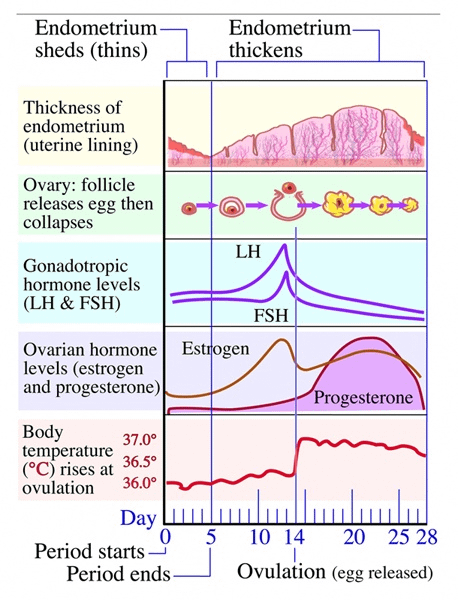Has this ever happened to you? You are doing your work thing, and the same topic keeps coming up over and over again? For a sexologist, the dilemmas often are about sex practices. However, March has been about menstruation, so here are more menstruation tips and education.
 This focus on periods points out to me how important it is that we teach proper sex education. Too many people don’t know basic biology. Trying not to be boring or too comprehensive, allow me to share a couple of the instances that have come up.
This focus on periods points out to me how important it is that we teach proper sex education. Too many people don’t know basic biology. Trying not to be boring or too comprehensive, allow me to share a couple of the instances that have come up.
Menstruation Education
A fun newsie site I read on Facebook is Hellogiggles.com. They posted an article called “I tried a period sea sponge, and this is what happened.” I responded with my two cents: “You can also have penetrative sex with the sea sponge inside while you have your period. Just insert a freshly rinsed and squeezed sponge before “gettin’ bizzay.” A smaller sponge might not be as noticeable to anyone inserting themselves into the vagina. Then Voilà! Minimal blood seepage. I wrote about it here too: my blog.” My bottom line regarding the sponge is that I like it, but you have to be very comfortable with your body and a lot of blood.
A woman replied to my response and posted some good, if not a little underinformed, questions (expletives deleted): “Why the […] would anyone want to have sex with it in? How […] does one ‘get off’? And if you are trying to get pregnant you got a […] sponge in the way” and added a two-part question: “What if your partner doesn’t like it or it feels weird penetrating him with a […] sponge?”
Eye-opening
People work themselves up about this topic that impacts a huge portion of the population very regularly. Some of those questions also indicate some misunderstandings regarding orgasm, reproduction, and why some people have sex. I responded to those five items as follows:
- Sometimes women want to have penetrative sex when they have their period.
- Getting off or not has nothing to do with the presence of a sponge in your vagina; many women orgasm as a result of clitoral stimulation (without any penetration).
- If you are trying to get pregnant, then the optimal time to have sex is during ovulation, roughly halfway between periods. There is little probability for a woman to get pregnant if she is having penis-in-vagina sex while she is actively menstruating, but it is possible.
- If your partner does not like the sponge, you can have penetrative sex while you are menstruating without it; just put a sheet or covering down to absorb any blood or have a towel handy for easy cleanup. Or, have sex in the shower.
- The sponge is not intended for his anus if you are penetrating him (?) as there is no flared base.
- I want to emphasize: The important part about using a sea sponge is to follow the instructions for use. Just like tampons, a sponge has to be changed frequently. Unlike a tampon, a sponge is CLEANED and sanitized to use again. Maybe that is why the FDA got involved; perhaps women must handle the hygiene of these items correctly?
Of course, I am sure the woman she is doing the best she can with the education and information provided to her. I do hope she can open her mind to the idea that not everyone is going to think like her. Vulva owners deserve to have menstruation tips and education that will help them manage their periods in the best ways possible that work for their lifestyles. Which brings me to another instance and the continuation of my menstruation month.
The Red Elephant in the Room
I went to a conference sponsored by The Red Web Foundation. We met “to learn the tools to break the cycle of shame and secrecy surrounding menstruation.” One presentation highlighted how different cultures historically handled menstruation and showed how the concealment and shame taboos get in the way of people learning real information. It was a great conference and a sex geek like me totally got to geek out on all things menstruation. I even learned a new euphemism for vagina – “Downtown Dining & Entertainment District.” My takeaway: all vulva owners deserve accurate information about their bodies, including their periods, their cycles, and what’s normal, and when they should seek assistance.
Lack of education about periods
I have such an overwhelming sense of frustration. It goes back to my takeaway and the sad reality that accurate information to the people who menstruate is often not provided. Menstruators who get their period before their peers (for instance, a 9-year old) seem to get little to no information from the adults in their lives and subsequently think they are dying when blood shows up in their underwear. Other kids seem to get a heads up and expect the bleeding; sometimes from their peers, sometimes from school. The question I wonder is how many kids tie this to fertility and understand that this means they could now get pregnant? I would prefer to go into a little more depth to help vulva owners understand how amazing their bodies are. Like covering the fact that this happens every month:

We all need menstruation tips and education, regardless of gender. Ignoring this topic in schools – and neglecting to inform the boys about menstruation as well – gives a sense that this natural occurrence happening to vulva owners is somehow shameful (it is not). I think it is okay to cover this topic with children as early as 9 years old, although the kids probably will not comprehend it until they are 12 years old. Menstruation tips and education are health information and important for all genders to be aware of. When is menstruation taught if not in health class nor in “family life education”?
My daughters are 12 and 13 – ripe ages to begin their periods – yet in their public, California-progressive, puberty education classes, neither child has received more than a necessary explanation that blood builds up in the uterus to create a lining for a baby and if no baby, then the lining sheds from their uterus monthly. Put yourself in the shoes of that 9-year-old: How scary would that be to a young child to think they are dying because they seemingly spontaneously begin bleeding from “down there”?? Compound that fear if their parents have already established that genitals and such topics are not okay to discuss. This blatant omission feels psychologically abusive or neglectful to me.
Menstruation product concerns
Besides, corporate sponsored product placement (freebies!) in class, where do vulva owners learn about the various choices for period care? When do they learn to question the choices that are offered?
I used to blindly accept that the menstrual products offered were not that important. I never considered potential consequences from the materials that are used in tampons and pads. Now, I very rarely use pads or tampons because I got disgusted by some facts. A sample of the information that persuaded me is here:
“[…] the non-organic cotton in pads and tampons have soaked up at least some of the more than 55 million pounds of pesticides (PDF) sprayed on cotton fields in the US each year that occasionally make it into our surface water. Diuron, one of the herbicides used on cotton, has even been pegged as a “likely” human carcinogen by the EPA (PDF) and it’s also linked to birth defects. Then there’s the bleaching processes that gives pads and tampons their ivory white appearance. Most manufacturers bleach rayon by using the disinfectant chlorine dioxide in a process that produces trace amounts of a toxin called dioxin, which is known to cause reproductive and developmental impairment at certain levels, though the FDA says that dioxins in contemporary tampons exists at extremely low levels that are hardly detectable.”..
At the Sex Ed Conference in December 2014, I recorded a table demonstration of a test and saw disturbing results: a brand new tampon was placed into a glass of water. Over time, the residue of fibers from the tampon clouded the water. That convinced me to avoid putting anything like that inside me whenever I have the choice. Now I use The DivaCup, but that might not be everyone’s cup of tea.
More options
Many other choices exist for menstruators these days. Some examples are:
- Disposable organic cotton pads by Honest Company, & Seventh Generation.
- Organic re-usable cloth options by Gladrags, LunaPads.
- Insertables (like tampons) to absorb and/or catch blood: The Diva Cup, Sea Sponges, Instead Softcup.
- go without pads or insertables and wear nice underwear: Dear Kates, THINX.
As I said earlier, you can have sex with a sea sponge in. It’s not the only product that allows that though. You can penetrate a vagina while an Instead Softcup is inside as well. Please note: neither of these is birth control, nor will they protect you from STI’s.
Test, and test again
I encourage you to find out if any of these works well for you. Check out reviews and websites. Be discerning about what you will accept in and around your vulva. It’s your body and you are free to make these choices for you.
It’s not like we can ignore menstruation. Join me in speaking out with your kids and your friends about menstruation. Together we can reduce the concealment and shame taboos about menstruation. Maybe one-day, penis owners can run to the store to get menstrual products for us without embarrassment. I hope we can eventually get to the point where we can celebrate our fertility like cultures of yore.
The MamaSutra

